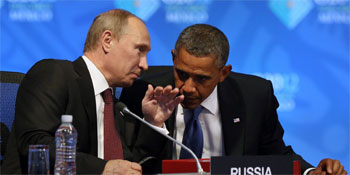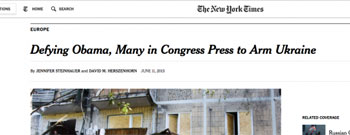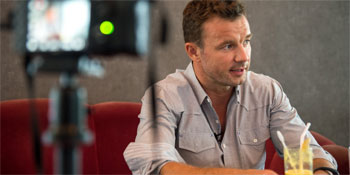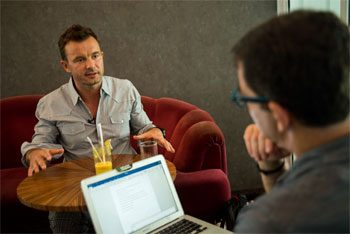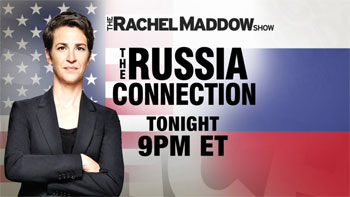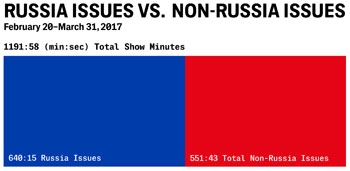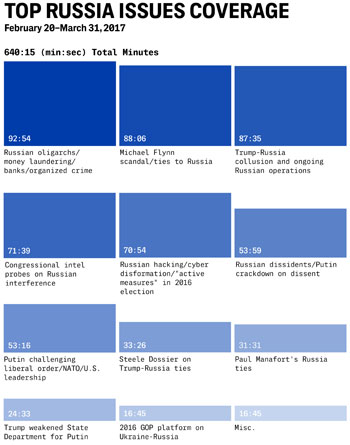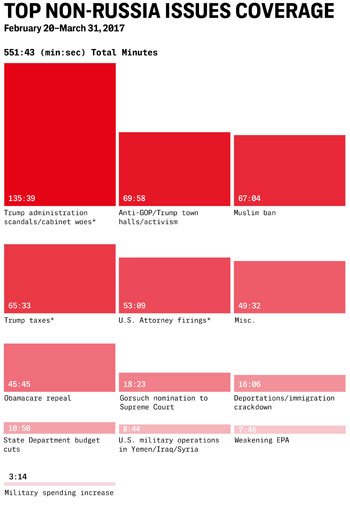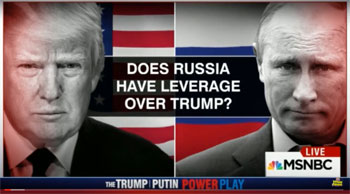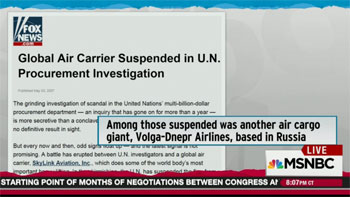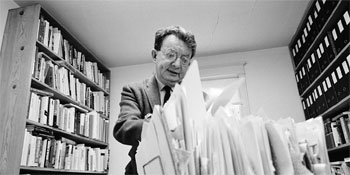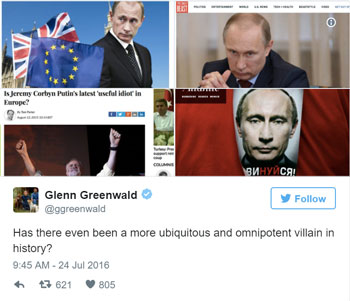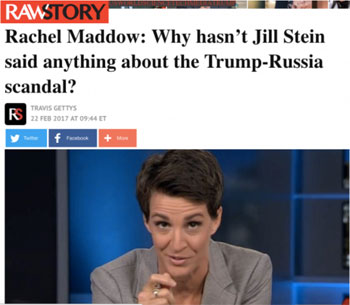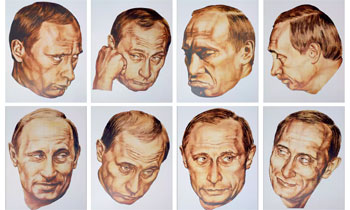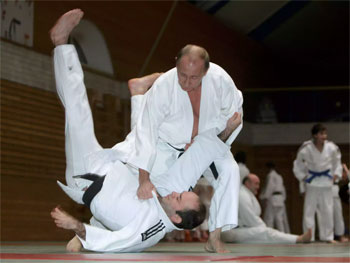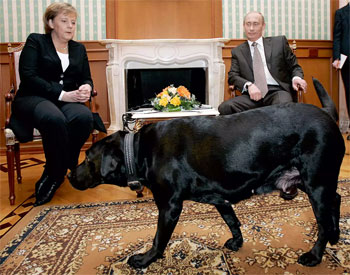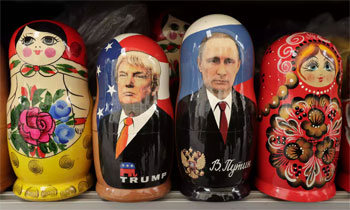Re: Clinton Journalist Has Meltdown After His Russian Conspi
The Myths of ‘Democracy Assistance’: U.S. Political Intervention in Post-Soviet Eastern Europe (EXCERPT)
by Gerald Sussman
NOTICE: THIS WORK MAY BE PROTECTED BY COPYRIGHT
‘Americans to the Rescue’—A Russian Assignment
With the collapse of the Soviet Union in the 1990s, the U.S. electioneering industry began to operate in a more globalized environment, sustained by state funding and encouragement to establish in the name of “freedom” new bridgeheads for neoliberal economic conquests. As a former bête noire, Russia was an electioneering plum for U.S. foreign policy planners. Initially, with production of political television spots in 1993 and then in the 1996 Russian presidential election, the first American consultants were invited to Moscow to spin the blessings of capitalism and Boris Yeltsin over communism and Communist Party (KPRF) challenger Gannady Zyuganov. Just prior to the election campaign, the United States helped bankroll Yeltsin with $14 billion in loans. German Chancellor Helmut Kohl committed an additional $2.7 billion, most of which was fully unconditional (thereby permitting its use for massive vote-buying), and French Prime Minister Alain Juppé added $392 million to the kitty, “paid entirely into Russian state coffers.” International Monetary Fund managing director Michel Camdessus committed his organization, as a “moral obligation,” to supporting Yeltsin’s privatization plans. Most of the IMF funds went to the state treasury for discretionary spending—with the caveat that financial assistance would be suspended in the event of a Communist Party election victory. “In the end, though, the KPRF’s door-to-door campaign was obliterated by the heavily researched, well-financed, media saturating, modern campaign waged by the Yeltsin team.”9
Operating under cloak in the Yeltsin campaign were American consultants, George Gorton, Joe Shumate, and Richard Dresner, who previously had worked together on Pete Wilson’s California gubernatorial campaign.10 At a moment when Yeltsin fared poorly in the polls, the three were asked to use their American razzmatazz to help “rescue” Boris. They were joined in this task by Steven Moore, an American public relations specialist, and a Russian TV advertising production company, Video International. Dresner was a former business partner of Dick Morris and former gubernatorial campaign consultant to Bill Clinton. Morris, in turn, was Clinton’s main political advisor (previously having worked for conservative southern senators, Trent Lott and Jesse Helms) and acted as a liaison between the U.S. president and Morris’s friends on the Yeltsin team. Despite these close associations, the consultants denied any connections between the Russian campaign and the White House.11
Video International (VI) staff were trained for the election by the American advertising firm Ogilvy and Mather (part of the worldwide WPP advertising group). The campaign strategy, including use of archival footage of Stalin’s brutality, was to attack the KPRF and Zyuganov with an assortment of anti-communist tactics. Within just a few years of the fall of the Soviet Union, this was an extraordinary turnaround in Russian (formerly Soviet) politics. As one scholar found in her interviews with VI, the company’s producers mocked Zyuganov for failing to grasp the importance of political marketing, which suggested yet another remarkable adaptation in Russian political thinking.12
VI was run by former KGB member Mikhail Margolev, who had previously spent five years with American advertising agencies. Margolev next joined the Putin public relations team for the 2000 election campaign. Since then he has became a “senator” in the Federation Council, Russia’s legislative upper chamber. He and other close advisors to Putin have been receiving “first-hand insights into strategies and techniques of American campaign practice,” a tutelage they presumably assume will assist their leader’s grand political ambitions. Another VI company executive, Mikhail Lesin, became Putin’s press minister. Lesin is known in Russia for harassing media outlets that are critical of the Putin government, marking the growing authoritarian style of that leadership.13
The American campaign consultants worked closely with Yeltsin’s daughter and campaign operations manager, Tatyana Dyachenko, passing on to their Russian counterpart the American techniques of spin-doctoring. According to a published news report, “they advised the campaign on organization, strategic and tactical use of polls and focus groups” with a “central campaign message of anti-communism,” a role they shared with Burson-Marsteller and other American public relations firms. They also urged Yeltsin to assert authoritarian control and think in terms of how to make the state-run television stations “bend to your will.” Boasting that they had saved Yeltsin from certain defeat and Russia from a return to the Cold War, the consultants admitted to employing a host of manipulative tactics in their advertising strategy to sow fear among Russians, a style that has been well-rehearsed by many Republican political strategists. A Time magazine report on these events came with the brazen cover lead, “Yanks to the Rescue”—later inspiring a Showtime (cable TV and subsequent DVD) film undertaking, Spinning Boris, about how the heroics of American political consultants “saved Russia from communism.”14
The consultants’ political ads, mostly aired over state-run television and radio stations, which Yeltsin fully controlled, repeatedly pitched the theme that a Zyuganov victory would bring back a command economy and a climate of terror. For “personality” styling designed to capture the youth vote, the Americans asked Yeltsin to appear at rock concerts and had him “jitterbug” onstage at one of them. Some of Yeltsin’s Russian advisors did not approve of the stunt, possibly because it caused the candidate’s heart attack in the midst of the campaign. Ignored in the campaign slogans, and by the Clinton administration, were the out-of-control economy, Yeltsin’s poor health and alcohol addiction, and his broad use of repressive policies. Despite his autocratic tendencies, disregard for constitutionally guaranteed freedoms, frequent money-laundering scandals, and brutal war in Chechnya, Yeltsin received the unreserved endorsement of the leaders of the main market economies, as if open markets were the true measure of a democracy. A Time correspondent rationalized the American intervention in pure Machiavellian logic: “Democracy triumphed—and along with it came the tools of modern campaigns, including the trickery and slickery Americans know so well. If these tools are not always admirable, the result they helped achieve in Russia surely is.”15
Russians too have learned the dark arts of Machiavellian political chicanery. Moscow hosts a Center of Political Consulting, more popularly known as “Niccolo M”—referring to the famed theorist of political manipulation and spin. By 2002, Niccolo M, whose organizers were trained in NED-funded seminars by the NDI and IRI, was joined in Russia’s new electioneering business by several other new political consulting groups, such as the Center of Political Technologies, which helps design campaign strategies and arrange contacts between businesses and Kremlin officials. Niccolo M staff used all the methods learned from their mentors, including candidate marketing, polling, focus groups, direct mail, phone banks, heavy use of the mass media, attack ads, and spin doctoring. Following its 1996 election defeat, the KPRF began studying Western campaign manuals and adopting the same tactics. Russian business groups have learned to give their money directly to the consultants rather than to candidates for tighter control over policy making, a practice that corresponds to soft-money election financing in the United States.16
An NDI assessment congratulated itself on the role it played in transforming Russian society through the introduction of American electioneering techniques. Under U.S. influence, Russian political parties, the study confidently claimed, were now
If the U.S. influenced Russian politics as much as the NDI claimed, then the accession of Vladimir Putin suggests that American campaign practices have little to do with institutionalizing democracy.
In fact, American “democracy assistance” to Russia has been part of a larger project to transform that country into an open market economy and place it under the control of stable and reliable pro-capitalist, pro-U.S. elected officials, regardless of their anti-democratic history or inclinations. In the early 1990s, Harvard University’s Institute for International Development (HIID), which “served as the gatekeeper for hundreds of millions of dollars in USAID and G-7 taxpayer aid, subsidized loans, and other Western funds,” sent a team of economic “shock therapists,” led by Jeffrey Sachs. HIID’s influence extended to the coordination of $300 million in USAID grants that went to the global public relations firm Burson-Marsteller and the “big six” international accounting firms operating in Russia to help sell the privatization program.18 Working closely with Anotoly Chubais, Yeltsin’s first deputy prime minister, minister of finance, and chief of staff, HIID support led to the conversion of major state enterprises to private ownership. The Harvard group actually “drafted many of the Kremlin decrees” to this effect.19 The policies the Sachs group advocated have been widely discredited as disastrous, as measured by subsequent Russian quality of life indicators.
by Gerald Sussman
NOTICE: THIS WORK MAY BE PROTECTED BY COPYRIGHT
YOU ARE REQUIRED TO READ THE COPYRIGHT NOTICE AT THIS LINK BEFORE YOU READ THE FOLLOWING WORK, THAT IS AVAILABLE SOLELY FOR PRIVATE STUDY, SCHOLARSHIP OR RESEARCH PURSUANT TO 17 U.S.C. SECTION 107 AND 108. IN THE EVENT THAT THE LIBRARY DETERMINES THAT UNLAWFUL COPYING OF THIS WORK HAS OCCURRED, THE LIBRARY HAS THE RIGHT TO BLOCK THE I.P. ADDRESS AT WHICH THE UNLAWFUL COPYING APPEARED TO HAVE OCCURRED. THANK YOU FOR RESPECTING THE RIGHTS OF COPYRIGHT OWNERS.
‘Americans to the Rescue’—A Russian Assignment
With the collapse of the Soviet Union in the 1990s, the U.S. electioneering industry began to operate in a more globalized environment, sustained by state funding and encouragement to establish in the name of “freedom” new bridgeheads for neoliberal economic conquests. As a former bête noire, Russia was an electioneering plum for U.S. foreign policy planners. Initially, with production of political television spots in 1993 and then in the 1996 Russian presidential election, the first American consultants were invited to Moscow to spin the blessings of capitalism and Boris Yeltsin over communism and Communist Party (KPRF) challenger Gannady Zyuganov. Just prior to the election campaign, the United States helped bankroll Yeltsin with $14 billion in loans. German Chancellor Helmut Kohl committed an additional $2.7 billion, most of which was fully unconditional (thereby permitting its use for massive vote-buying), and French Prime Minister Alain Juppé added $392 million to the kitty, “paid entirely into Russian state coffers.” International Monetary Fund managing director Michel Camdessus committed his organization, as a “moral obligation,” to supporting Yeltsin’s privatization plans. Most of the IMF funds went to the state treasury for discretionary spending—with the caveat that financial assistance would be suspended in the event of a Communist Party election victory. “In the end, though, the KPRF’s door-to-door campaign was obliterated by the heavily researched, well-financed, media saturating, modern campaign waged by the Yeltsin team.”9
Operating under cloak in the Yeltsin campaign were American consultants, George Gorton, Joe Shumate, and Richard Dresner, who previously had worked together on Pete Wilson’s California gubernatorial campaign.10 At a moment when Yeltsin fared poorly in the polls, the three were asked to use their American razzmatazz to help “rescue” Boris. They were joined in this task by Steven Moore, an American public relations specialist, and a Russian TV advertising production company, Video International. Dresner was a former business partner of Dick Morris and former gubernatorial campaign consultant to Bill Clinton. Morris, in turn, was Clinton’s main political advisor (previously having worked for conservative southern senators, Trent Lott and Jesse Helms) and acted as a liaison between the U.S. president and Morris’s friends on the Yeltsin team. Despite these close associations, the consultants denied any connections between the Russian campaign and the White House.11
Video International (VI) staff were trained for the election by the American advertising firm Ogilvy and Mather (part of the worldwide WPP advertising group). The campaign strategy, including use of archival footage of Stalin’s brutality, was to attack the KPRF and Zyuganov with an assortment of anti-communist tactics. Within just a few years of the fall of the Soviet Union, this was an extraordinary turnaround in Russian (formerly Soviet) politics. As one scholar found in her interviews with VI, the company’s producers mocked Zyuganov for failing to grasp the importance of political marketing, which suggested yet another remarkable adaptation in Russian political thinking.12
VI was run by former KGB member Mikhail Margolev, who had previously spent five years with American advertising agencies. Margolev next joined the Putin public relations team for the 2000 election campaign. Since then he has became a “senator” in the Federation Council, Russia’s legislative upper chamber. He and other close advisors to Putin have been receiving “first-hand insights into strategies and techniques of American campaign practice,” a tutelage they presumably assume will assist their leader’s grand political ambitions. Another VI company executive, Mikhail Lesin, became Putin’s press minister. Lesin is known in Russia for harassing media outlets that are critical of the Putin government, marking the growing authoritarian style of that leadership.13
The American campaign consultants worked closely with Yeltsin’s daughter and campaign operations manager, Tatyana Dyachenko, passing on to their Russian counterpart the American techniques of spin-doctoring. According to a published news report, “they advised the campaign on organization, strategic and tactical use of polls and focus groups” with a “central campaign message of anti-communism,” a role they shared with Burson-Marsteller and other American public relations firms. They also urged Yeltsin to assert authoritarian control and think in terms of how to make the state-run television stations “bend to your will.” Boasting that they had saved Yeltsin from certain defeat and Russia from a return to the Cold War, the consultants admitted to employing a host of manipulative tactics in their advertising strategy to sow fear among Russians, a style that has been well-rehearsed by many Republican political strategists. A Time magazine report on these events came with the brazen cover lead, “Yanks to the Rescue”—later inspiring a Showtime (cable TV and subsequent DVD) film undertaking, Spinning Boris, about how the heroics of American political consultants “saved Russia from communism.”14
The consultants’ political ads, mostly aired over state-run television and radio stations, which Yeltsin fully controlled, repeatedly pitched the theme that a Zyuganov victory would bring back a command economy and a climate of terror. For “personality” styling designed to capture the youth vote, the Americans asked Yeltsin to appear at rock concerts and had him “jitterbug” onstage at one of them. Some of Yeltsin’s Russian advisors did not approve of the stunt, possibly because it caused the candidate’s heart attack in the midst of the campaign. Ignored in the campaign slogans, and by the Clinton administration, were the out-of-control economy, Yeltsin’s poor health and alcohol addiction, and his broad use of repressive policies. Despite his autocratic tendencies, disregard for constitutionally guaranteed freedoms, frequent money-laundering scandals, and brutal war in Chechnya, Yeltsin received the unreserved endorsement of the leaders of the main market economies, as if open markets were the true measure of a democracy. A Time correspondent rationalized the American intervention in pure Machiavellian logic: “Democracy triumphed—and along with it came the tools of modern campaigns, including the trickery and slickery Americans know so well. If these tools are not always admirable, the result they helped achieve in Russia surely is.”15
Russians too have learned the dark arts of Machiavellian political chicanery. Moscow hosts a Center of Political Consulting, more popularly known as “Niccolo M”—referring to the famed theorist of political manipulation and spin. By 2002, Niccolo M, whose organizers were trained in NED-funded seminars by the NDI and IRI, was joined in Russia’s new electioneering business by several other new political consulting groups, such as the Center of Political Technologies, which helps design campaign strategies and arrange contacts between businesses and Kremlin officials. Niccolo M staff used all the methods learned from their mentors, including candidate marketing, polling, focus groups, direct mail, phone banks, heavy use of the mass media, attack ads, and spin doctoring. Following its 1996 election defeat, the KPRF began studying Western campaign manuals and adopting the same tactics. Russian business groups have learned to give their money directly to the consultants rather than to candidates for tighter control over policy making, a practice that corresponds to soft-money election financing in the United States.16
An NDI assessment congratulated itself on the role it played in transforming Russian society through the introduction of American electioneering techniques. Under U.S. influence, Russian political parties, the study confidently claimed, were now
targeting their communication to voters based on demographic and geographic information…conducting research on voter attitudes through focus groups and polling…small meetings, coalitions with civic groups, door knocking, phone banks, and public leafleting; organizing more sophisticated press operations that attempt to create news and respond to events….Much of this change can be attributed to NDI training. (emphasis added)17
If the U.S. influenced Russian politics as much as the NDI claimed, then the accession of Vladimir Putin suggests that American campaign practices have little to do with institutionalizing democracy.
In fact, American “democracy assistance” to Russia has been part of a larger project to transform that country into an open market economy and place it under the control of stable and reliable pro-capitalist, pro-U.S. elected officials, regardless of their anti-democratic history or inclinations. In the early 1990s, Harvard University’s Institute for International Development (HIID), which “served as the gatekeeper for hundreds of millions of dollars in USAID and G-7 taxpayer aid, subsidized loans, and other Western funds,” sent a team of economic “shock therapists,” led by Jeffrey Sachs. HIID’s influence extended to the coordination of $300 million in USAID grants that went to the global public relations firm Burson-Marsteller and the “big six” international accounting firms operating in Russia to help sell the privatization program.18 Working closely with Anotoly Chubais, Yeltsin’s first deputy prime minister, minister of finance, and chief of staff, HIID support led to the conversion of major state enterprises to private ownership. The Harvard group actually “drafted many of the Kremlin decrees” to this effect.19 The policies the Sachs group advocated have been widely discredited as disastrous, as measured by subsequent Russian quality of life indicators.
